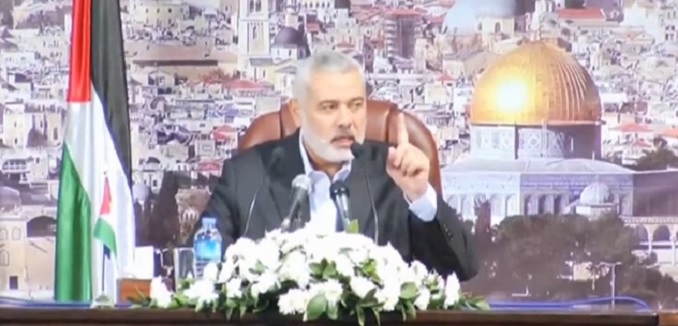Unity talks between the Palestinian Fatah and Hamas factions have reportedly stalled amid Fatah demands – and Hamas refusals – that new elections be held to provide Palestinian lawmakers with a mandate to rule over some of the areas that they claim for a future Palestinian state.
Amin Maqboul, the secretary-general of Fatah’s revolutionary council, told Ma’an that Azzam al-Ahmad “would not travel to the Gaza Strip before we receive official notification confirming that Hamas has agreed to general elections and a national consensus government.”
The deadlock is a symptom of a fundamental dynamic that has consistently blocked reconciliation efforts: Hamas controls the Gaza Strip and Fatah controls portions of the West Bank, and elections that unified the two territories would by definition require one faction to yield its power. Meanwhile Hamas Prime Minister Ismail Haniyeh reiterated the terror group’s commitment to the eradication of Israel, with a Hamas outlet conveying further comments from him declaring that ‘the Palestinian people have elements of strength including faith, fortitude and weaponry.’
“The Palestinian people are the maker of events in the Palestinian arena because they are on the land of struggle and the land of Jerusalem,” Haneyya said. He emphasized that the conflict with the Israeli occupation is not a mere fighting over borders and land, but it is a struggle to defend the nation, the holy sites and the Palestinian identity.”We address our internal issues with wisdom, and tackle matters with Arab countries with patience. Our sole and eternal struggle is against the occupation that desecrates the land and holy sites.”
Hamas’s stance toward the Jewish state has created a kind of double-bind in the context of Palestinian unity and the peace process. On one hand, analysts have long emphasized that the Gaza Strip and the West Bank must be brought under a single government, lest a Palestinian state be born as a failed state with sovereign territories ruled by competing factions. On the other hand, any Palestinian government is bound by treaty obligations made to Jerusalem that acknowledge Israel’s existence. Abrogating those commitments would all but confirm fears – long voiced both in the West and inside Israel – that the Palestinians intend to pocket irreversible Israeli territorial concessions and then backslide on symbolic concessions involving coexistence. It is difficult to imagine how any Israeli leader could responsibly continue pursuing negotiations after such Palestinian moves.
[Photo: News Daily Planet + / YouTube]




